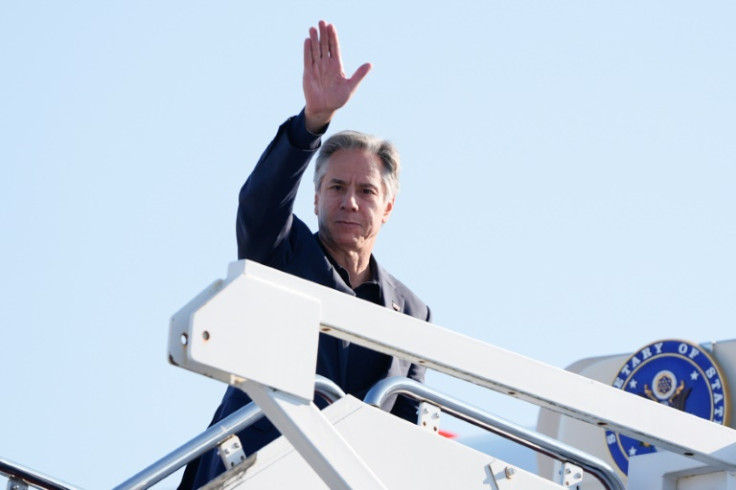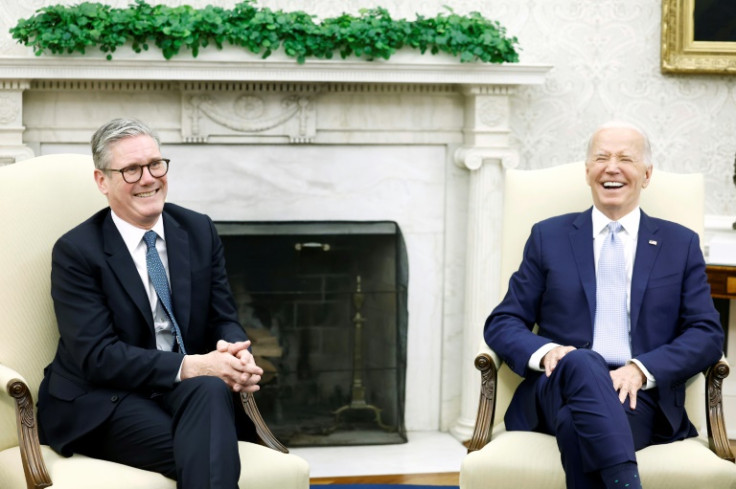Blinken In UK As Allies Seek Way Forward On Ukraine, Mideast

US Secretary of State Antony Blinken meets the new UK government on Tuesday, with the close allies expected to share their resolve on Ukraine and paper over differences on Gaza.
The top US diplomat's trip comes ahead of a White House visit on Friday by Prime Minister Keir Starmer, his second visit to Washington since his Labour Party triumphed in July elections and swept out the Conservatives after 14 years.
While the US-UK "special relationship" has persevered across partisan lines, Labour has traditionally been closer in its core principles to President Joe Biden's Democratic Party.
But for Starmer, a full alignment with the Democrats' agenda could carry risks just two months before US elections in which Biden's political heir Kamala Harris is running neck and neck with Republican Donald Trump.
Starmer has made clear that he will maintain the previous Conservative government's stance of staunchly backing Ukraine against Russia's invasion, with Britain frequently in the lead in nudging the United States to ease restrictions on military support.
Blinken is expected to speak to Starmer and Foreign Secretary David Lammy about ways to rally further behind Ukraine, which is waging a bold offensive into Russian territory as Moscow trudges further on the ground inside Ukraine's east.
Last week, London said it was sending 650 new specialist missile systems to boost Ukrainian air defences, after President Volodymyr Zelensky criticised the pace of weapons deliveries.
Lammy said London and Washington were "committed to supercharging our alliance", as "in a more volatile and insecure world, it is even more important that we are highly aligned nations".
Tuesday's meeting would be the start of a new strategic dialogue to "strengthen the special relationship", and would cover the countries' "unwavering support for Ukraine" and their commitment to peace in the Middle East.
"Together we are re-energising our economic partnership, working together to tackle insecurity abroad and facing the future in unity and confidence," he added.
Former human rights lawyer Starmer, however, has taken a harder line than the Conservatives on Israel, which relies on the United States as its foremost backer in the Gaza war.
His Labour government last week announced restrictions on some weapons to Israel, voicing concern that they could be used to violate international humanitarian law.
The United States declined to criticise Britain's decision, saying that its ally had its own processes to make assessments, even after the US State Department's own review concluded there were no grounds to restrict weapons.
The Labour government has also dropped its Conservative predecessor's plans to challenge the right of the International Criminal Court to seek the arrest of Israeli Prime Minister Benjamin Netanyahu.
The United States -- while backing The Hague-based court when it comes to Russia -- has denounced the bid to target Netanyahu, arguing that Israel has its own ways to ensure accountability.
On one issue the Labour government could prove to be a major relief for Biden -- Ireland.
Biden, proud of his Irish heritage, has made no secret of his alarm that the Conservatives were jeopardising the fragile peace in Northern Ireland through Britain's divorce with the European Union.
Starmer on Saturday paid a friendly visit to Ireland with a goal of resetting relations, with both countries pledging to safeguard the Good Friday Agreement, the landmark US-mediated accord from 1998 that ended decades of sectarian violence over British rule in Northern Ireland.
Since taking power, Starmer has moved to begin the repeal of a law granting conditional immunity to perpetrators of crimes during the so-called "Troubles".
The State Department said that Blinken would also speak to his British counterparts about Asia, which the United States insists remains a top priority despite needing to focus on the Middle East and Ukraine.
The Biden administration forged the three-way AUKUS alliance bringing together the United States, Britain and Australia, bolstering military ties in the face of a rising China.

© Copyright AFP 2025. All rights reserved.





















